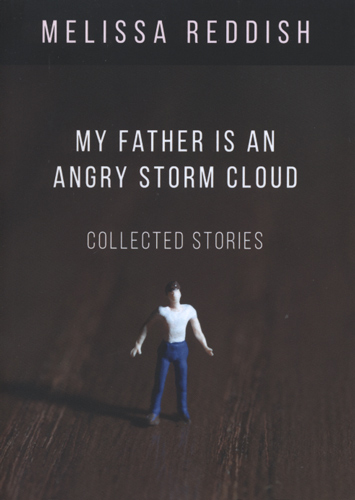My Father is an Angry Storm Cloud
What initially drew me to Melissa Reddish’s recent book was the title: My Father is an Angry Storm Cloud. It resonated with me, and I was happy to learn that this title is also the title of one of the short stories in the book. I will admit that I initially rushed past the first couple pieces to get to it. I was not disappointed. “My Father is an Angry Storm Cloud” is poignant, and thankfully not in the “oh woe is me” way. This story was clearly delicately crafted to avoid hitting the reader over the head with “daddy issues.” In this snapshot of her life, I got a well-rounded sense that this character existed before the scene she appears in. It is clear that this character has scars from her past, that they re-open all the time, and that she struggles to stitch them up even as an adult. To get that grand a sense of a life already lived within six pages is pretty remarkable. What initially drew me to Melissa Reddish’s recent book was the title: My Father is an Angry Storm Cloud. It resonated with me, and I was happy to learn that this title is also the title of one of the short stories in the book. I will admit that I initially rushed past the first couple pieces to get to it. I was not disappointed. “My Father is an Angry Storm Cloud” is poignant, and thankfully not in the “oh woe is me” way. This story was clearly delicately crafted to avoid hitting the reader over the head with “daddy issues.” In this snapshot of her life, I got a well-rounded sense that this character existed before the scene she appears in. It is clear that this character has scars from her past, that they re-open all the time, and that she struggles to stitch them up even as an adult. To get that grand a sense of a life already lived within six pages is pretty remarkable.
Comprised of ten short stories, all of which have been previously published in literary magazines, the collection has a “spooky” element to it. For example, in “Protest” a child becomes obsessed with physically indicating his protests to things like shootings, war, and the like. This obsession gets so intense that soon his body is covered with armbands, chains, and whatever else he can find. In “Grade A,” the main character’s mother has what I assume to be Alzheimer’s, and he works in the Perdue factory, supervising line workers dismembering chickens. In “A Haunting”—well, the title tells you the “spooky” factor.
And what’s “spooky” isn’t necessarily ghosts or hallucinations. Had every story ended up with a child disappearing or a father’s ghost, I think I would have grown tired of the similarity. But Reddish applies “spooky” not to just what’s happening in the story, but to how the story is written. The constant theme across every piece is the air of unknowing, of ending the story even though it doesn’t quite feel finished. There’s no real resolution. All these things that happen in these pieces just are. And that’s part of what I adore about this book. Reddish puts these things in front of you, getting you really involved and interested in these increasingly wild plots, and then it just ends. You have to make sense of it on your own. The readers gets to take from it what they want, or what they see, which is something I’ve not experienced much fiction do.
Reddish did a fantastic job of giving readers just enough detail without bogging them down by the specifics of everything. All the stories were beautifully written, very much like poetry in prose form. Better yet, the writing was concise. Reddish doesn’t let her descriptions go on for the sake of whimsical resonance. Every detail is significant, yet poetic without sounding extraneous and over-the-top. This specificity helps to ground readers in the story, which is particularly impressive in those pieces with a supernatural backdrop. This particular faction of Reddish’s writing style is executed most successfully in “My Father is an Angry Storm Cloud,” in which she uses the rain as her major grounding tool. It’s something we not only recognize as a more than common occurrence, but it also subtly reiterates the mood of the piece overall. The words she uses to describe the rain tie together the situational and the emotional setting. And that’s only one example. Reddish does this successfully in all of the pieces included in this collection.
Each story in My Father is an Angry Storm Cloud is impressive for one reason or another. I was actually disappointed that were only 189 pages for me to gobble up. For such a small book, it packs a lot between its pages. There is no fluff, nothing that sounds like it doesn’t belong. This is literature, and accessible to a wide range of readers. Reddish is nothing short of masterful in her handle of the short form, perfect for both the avid and the occasional reader.





